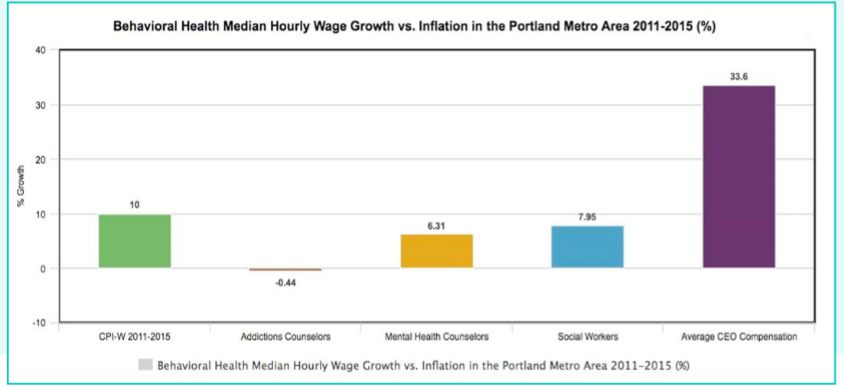A new report from the American Federation of State, County & Municipal Employees presents some good news—the vast expansion of the Oregon Health Plan means that Oregonians requiring mental health services are much more likely to see a provider.
Here's a graphic representation of what the Medicaid expansion that funds the Oregon Health Plan has meant to the largest providers of mental health services in Multnomah County:

On average, those providers have seen their revenue increase 40 percent since 2010, prior to the passage of the Affordable Care Act, which included the Medicaid expansion.
The bad news, AFSCME's research found, is that while the providers are getting more money and serving more patients, the burden is falling on front-line staff.
“While the behavioral health agencies are accepting a higher number of clients, there has not been a corresponding increase in behavioral health professionals to maintain the level of services,” the report says. “This has led to an increase in caseloads for behavioral health professionals and has markedly decreased access to care for clients, as there simply is not enough time in a workday to accommodate caseloads as high as 110 clients per provider.”
AFSCME, whose function is to improve the compensation and working conditions for members and prospective members, also found that the pay for front-line workers is also lagging behind inflation (shown below as CPI-W) and far behind the compensation of the CEO’s of the non-profits of the mental healthcare providers.

Although AFSCME’s direct interest is improving working conditions, the union’s report highlights the real impact on patients of a system that still provides far too little service to people in need.
“In a 2015 survey of mental health outcomes by Mental Health America, Oregon ranked 49th, ahead of only Arizona and Nevada,” the report says. “A 2016 update to that survey found that Oregon had fallen to 51st, behind every other state and the District of Columbia.”

